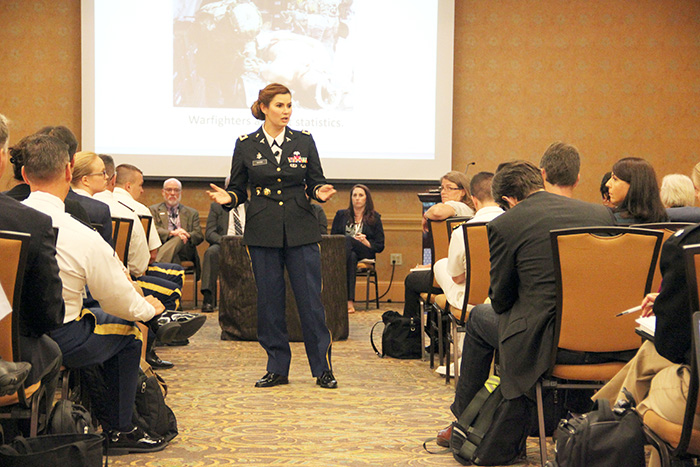Army, Civilian Experts Speak on Bridging from Research to Advanced Development and Fielding

Experts from the U.S. Army Medical Research and Materiel Command joined counterparts in military, government, industry and academia in a panel session at the Military Health System Research Symposium in Kissimmee, Florida, Aug. 29, addressing challenges in getting medical products through the system and to the field.
To an audience of about 200 attendees, including researchers, developers and vendors, the team described lessons learned and provided candid advice for turning good ideas into tangible solutions applicable to military health care. A central theme from the session was the value of understanding the intended user and taking the time to perform operational testing. In a military medical environment, that could be a clinician in a hospital, a medic on the battlefield or a Warfighter who has basic combat lifesaver training.
"Answer 'who and where' questions first, and involve users early," said Leigh Anne Alexander, a product manager from the U.S. Army Medical Materiel Agency, a subordinate organization of the USAMRMC.
The group also emphasized the value of involving the U.S. Food and Drug Administration "early and often." Speaking from experience, they agreed that engaging with the FDA early may smooth the regulatory process, which can be intimating for many smaller companies.
"There are three key pieces to transition a 'good idea' into advanced development," shared Casey Gilbertz, a USAMMA product manager. "Firstly, have a solid commercial market plan. Secondly, have a clear and detailed plan to get through the U.S. Food and Drug Administration process. Thirdly, develop a good manufacturing process."
Moderating the session was Capt. Joseph Cohn, Defense Health Agency; and Dr. Patricia Reilly, USAMRMC. In addition to Alexander and Gilbertz, panelists included USAMMA Commander Col. Lynn Marm; Brian Martin, U.S. Army Medical Research Acquisition Activity; Lisa Borek, U.S. Army Medical Materiel Development Activity; Lt. Col. Martin LeFrance, Air Force Medical Service Research and Acquisition; Jason Flint, Air Force Medical Evaluation Support; and Herbert Bresler, Battelle Memorial Institute.
The session also addressed medical logistics, advising that fielded products have to be sustainable. Marm described the numerous scientific advancements that have been made over the past 15 years but then reminded the group, "that was the last war."
"The future fight – which is now – puts us in a position that we have never been in before. We might not have intact communications and technology overmatch," said Marm. "We need the very best and brightest to help us design solutions that are suitable logistically and sustainable in the most austere environments."
Marm said we need industry to work with military medicine to design solutions with future needs in mind. Reflecting on the wars in Iraq and Afghanistan, Marm asked the group, "When we sent our Soldiers into combat thinking they were going to fight a traditional ground war but they faced insurgent fighters instead, who saw that coming?"
Answering her own question, she said, "The enemy."
The MHSRS is the Department of Defense's premier scientific annual meeting, which combines three previous conferences, including the former Advanced Technology Applications for Combat Casualty Care Conference; the Air Force Medical Service Medical Research Symposium; and the Navy Medicine Research Conference. By combining these conferences into one event, the meeting serves as a critical strategy session for leaders to set future milestones for the Department of Defense's deployment-related medical research programs, centered on the needs of the Warfighter. This year's symposium was the largest to date, with more than 2,700 registered attendees.
 An official website of the United States government
An official website of the United States government
 ) or https:// means you've safely connected to the .mil website. Share sensitive information only on official, secure websites.
) or https:// means you've safely connected to the .mil website. Share sensitive information only on official, secure websites.


